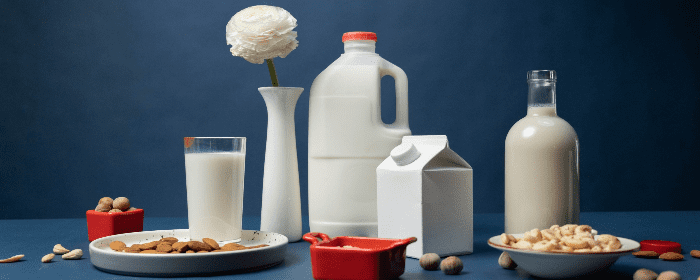You’re not alone if you’ve seen the term “mylk” and wondered if it’s a typo. While longtime vegans have known the term for years, it’s only recently become a mainstream way to differentiate between plant-based “mylk” and animal-based milk.
What If Your Almond Beverage Still Says “Milk”?
Many companies haven’t made the switch in names, but that doesn’t mean they’re not plant-based. For example, dairy and non-dairy beverages can fall under the “milk” title. However, only plant-based beverages can be called mylk.
Why Are So Many People Switching to Mylk?
Mylk products have become a popular alternative to traditional dairy milk for several reasons.
Lactose Intolerance
Dairy products contain a sugar called lactose. After infancy, most humans suffer from lactose malabsorption. Up to 70% of adults lack the enzyme lactase in the small intestines that breaks lactose down into glucose and galactose.
Symptoms of lactose intolerance include:
- Abdominal pain
- Bloating
- Nausea
- Diarrhea
- Flatulence
Those whose bodies can’t process lactose typically begin experiencing these symptoms 30 minutes to two hours after eating or drinking foods containing dairy.
Lower Fat and Calories
Most mylks are lower in calories, and almost all mylks are lower in saturated fat than traditional dairy milk. In addition, plant-based mylks contain no cholesterol or lactose, making them a better choice for those who are lactose intolerant or have dysfunctional cardiovascular systems.
However, it’s worth noting that not all mylk has the same calcium and protein content that dairy milk offers. Many mylks are fortified with calcium, protein, and vitamins, though, so it pays to read each label before buying.
Better for the Environment
In general, animal products impact the environment significantly more than their plant-based alternatives. Since animals need food, water, and space, they take up agricultural areas that could be used to feed people.
A 2019 study found that producing one glass of dairy milk results in three times the greenhouse gases required to make plant-based mylk. Additionally, dairy milk production requires nine times the land of mylk alternatives.
Finding a plant-based alternative to dairy milk is easier than ever before. Switching from dairy milk to mylk is just as delicious and comparable in price. It’s worth experimenting with the many varieties available to see which one works for you.


 St. Petersburg, Florida
St. Petersburg, Florida
